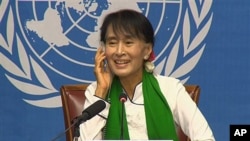Burmese pro-democracy Leader Aung San Sui Kyi says the development of democracy in her country hinges upon the implementation of the rule of law. In a major address to the International Labor Organization (ILO) in Geneva, the Nobel laureate pleaded for workers' rights and for foreign investments, which would advance Burma's economic and social development. Enthusiastic applause greeted the Burmese pro-democracy leader as she arrived to speak to thousands of delegates at the International Labor Conference. Aung San Suu Kyi thanked the ILO for its long campaign to eliminate forced labor and child soldiers in her country.
She welcomed the moves toward democratization taken by Burmese President U Thein Sein's government and elaborated on the many reforms she says need to be enacted to cement the human, political and labor rights of her people.
The Nobel Peace Prize laureate stressed the need for rule of law and an end to ethnic conflict in her country. She elaborated on this theme at a news conference following her address.
Aung San Suu Kyi told journalists she is concerned by the present situation in western Burma's Rakhine State, which has resulted in deadly clashes between the Buddhist Rakhine minority and Muslim Rohingya. She said the most important lesson to be learned from this is the need for rule of law.
"Rule of law is essential if we are to put an end to all conflict within the country. Everybody must have access to the protection of the law and, of course, they also have a duty to abide by the laws of the land. So without rule of law, such communal strife will only continue and ...the present situation will have to be handled with delicacy and sensitivity, and we need the cooperation of all peoples concerned to regain the peace that we want for our country."
The Muslim Rohingya descended from laborers imported from what is now Bangladesh by the British colonial government more than a century ago. The Rakhine regard them as foreign intruders. In 1982, Burma's military junta stripped the Rohingya of citizenship, classing them as illegal immigrants, thus rendering them stateless.
On the thorny issue of granting citizenship to the Rohingya, Aung San Suu Kyi said this matter should be resolved in accordance with the rule of law.
Suu Kyi said countries should consider lifting sanctions against Burma in a responsible way, in a way that advances democracy.
"With regard to sanctions, I think that it is the responsibility of the people of Burma to make certain that the democratization process continues," said Suu Kyi. "And I do not think that we should let this process be hurt by sanctions, by lifting of sanctions. That is why I have called for responsible democracy, friendly investment. Any investment, new investment that comes in because of the lifting or suspension of sanctions should add to the democratic process, rather than subtract from it."
Aung San Suu Kyi was under house arrest in Burma for much of the past 24 years. She refused to leave the country, fearing she would not be allowed to return. Despite the many hardships she has had to endure over the years, the Nobel laureate said what she wants most of all is reconciliation and not retribution.
Switzerland is the first stop on her 17-day tour of five European countries, which also include Norway, Britain, Ireland and France. On Saturday, in Oslo, Norway, she will accept the Nobel Peace Prize she was awarded 21 years ag




